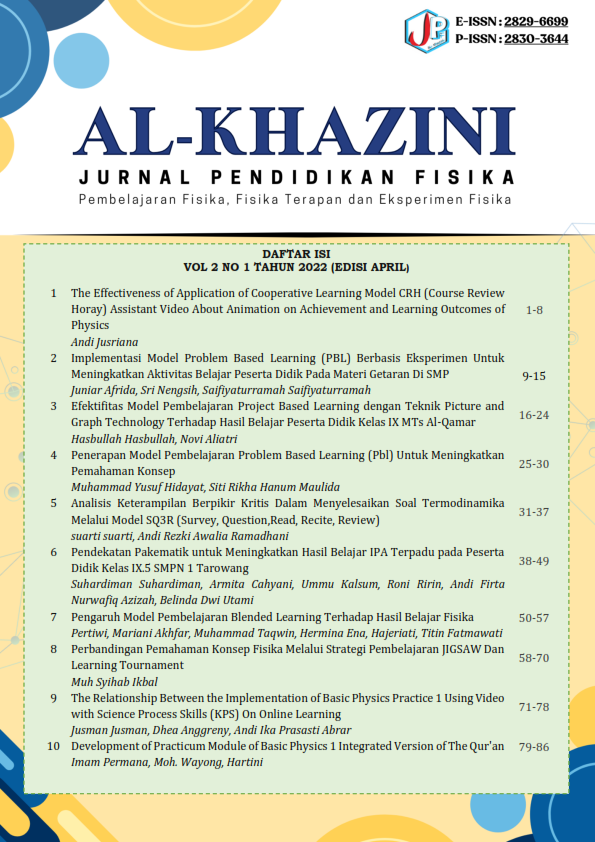Implementasi Model Problem Based Learning (PBL) Berbasis Eksperimen Untuk Meningkatkan Aktivitas Belajar Peserta Didik Pada Materi Getaran Di SMP
Abstrak
Model pembelajaran menjadi faktor penting saat dilakukan proses pembelajaran karena model pembelajaran merupakan suatu rencana yang membantu berdasarkan keberlansungan proses belajar dan dapat terlaksana sesuai dengan tujuan pembelajaran. Sehingga diperlukan penerapan model pembelajaran Problem Based Learning (PBL) berbasis eksperimen untuk meningkatkan aktivitas belajar peserta didik pada materi getaran. Penelitian ini bertujuan untuk (1) menerapkan model pembelajaran problem based learning (PBL) berbasis eksperimen untuk meningkatkan aktivitas belajar peserta didik (2) mengetahui hasil observasi yang didapatkan melalui model pembelajaran Problem Based Learning berbasis eksperimen. Metode penelitian yang digunakan adalahimetode ipenelitian ieksperimen (The Non-Equivalent Group Design). Hasil yang diperoleh dari tiga orang observer yaitu pada kelas eksperimen skor nilai rata-rata untuk Pelaksanaan = 89%, Reaksi = 89% dan Keaktifan = 84% dengan kategori sangat aktif. Sedangkan pada kelas kontrol skor nilai rata-rata untuk Pelaksanaan = 53%, Reaksi = 55% dan Keaktifan = 51% dengan kategori kurang aktif. Sehinggadapat dikatakanbahwa penerapan model pembelajaran problem based learning berbasis eksperimen dapat meningkatkan aktivitas belajar peserta didik pada materi getaran di SMP Negeri 1 Simpang Ulim.
##plugins.generic.usageStats.downloads##
The Authors submitting a manuscript do so on the understanding that if accepted Al-Khazini:Jurnal Pendidikan Fisika for publication, copyright publishing of the article shall be assigned/transferred to Physics Education Department, UIN Alauddin Makassar as Publisher of the journal. Upon acceptance of an article, authors will be asked to complete a 'Copyright Transfer Agreement'. An e-mail will be sent to the corresponding author confirming receipt of the manuscript together with a 'Copyright Transfer Agreement' form by the online version of this agreement.
Al-Khazini:Jurnal Pendidikan Fisika and Physics Education Department, UIN Alauddin Makassar, , and Physics Society of Indonesia as the Editors and the Advisory International Editorial Board make every effort to ensure that no wrong or misleading data, opinions or statements be published in the journal. In any way, the contents of the articles and advertisements published in the Al-Khazini:Jurnal Pendidikan Fisika are the sole and exclusive responsibility of their respective authors and advertisers.
The copyright form should be signed electronically and send to the Editorial Office in the form of the original e-mail: [email protected]

